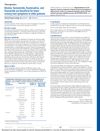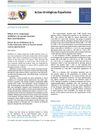 8 citations,
July 2019 in “Endocrine connections”
8 citations,
July 2019 in “Endocrine connections” Finasteride affects SRD5A2 gene pattern, possibly causing lasting side effects.
[object Object]  24 citations,
December 2013 in “Sexual medicine reviews”
24 citations,
December 2013 in “Sexual medicine reviews” Finasteride can cause sexual problems and depression in young men.
 139 citations,
December 2020 in “Cell Stem Cell”
139 citations,
December 2020 in “Cell Stem Cell” Male hormones affect COVID-19 severity and certain drugs targeting these hormones could help reduce the risk.
 4 citations,
November 2005 in “The Journal of Urology”
4 citations,
November 2005 in “The Journal of Urology” Large prostates link to more hair loss.
 March 2014 in “Journal of The American Academy of Dermatology”
March 2014 in “Journal of The American Academy of Dermatology” Mycophenolic acid may help hair growth, a combination treatment improves hair thickness in male hair loss, and early treatment of frontal fibrosing alopecia is important.
 20 citations,
May 2018 in “The Journal of Urology”
20 citations,
May 2018 in “The Journal of Urology” Men taking 5-alpha-reductase inhibitors before or after bladder cancer diagnosis had a lower risk of dying from the disease.
 40 citations,
April 2018 in “Endocrine”
40 citations,
April 2018 in “Endocrine” PFS and PSSD are similar conditions with persistent sexual dysfunction after stopping medication.
 15 citations,
March 2020 in “Anais Brasileiros De Dermatologia”
15 citations,
March 2020 in “Anais Brasileiros De Dermatologia” Finasteride may cause lasting sexual, mental, and physical symptoms; use with caution.
 112 citations,
July 2012 in “The Journal of Sexual Medicine”
112 citations,
July 2012 in “The Journal of Sexual Medicine” Finasteride may cause long-lasting sexual side effects.
 14 citations,
January 2021 in “Cureus”
14 citations,
January 2021 in “Cureus” The AndroCoV Clinical Scoring is a quick, accurate, and free tool for diagnosing COVID-19.
 20 citations,
March 2005 in “Current Medicinal Chemistry”
20 citations,
March 2005 in “Current Medicinal Chemistry” New compounds show promise for treating hair loss, enlarged prostate, and prostate cancer, with some being more effective and having different side effects than current treatments.
 7 citations,
August 2019 in “Aesthetic Plastic Surgery”
7 citations,
August 2019 in “Aesthetic Plastic Surgery” Both surgical and non-surgical hair loss treatments lack a standard treatment plan and sufficient patient satisfaction data.
 July 2012 in “The Journal of Urology”
July 2012 in “The Journal of Urology” Testosterone increases muscle mass regardless of DHT conversion blocking.
 3 citations,
March 2016 in “Medicinal Chemistry Research”
3 citations,
March 2016 in “Medicinal Chemistry Research” Scientists found out the structure of a human enzyme linked to prostate cancer and hair loss, which could help in designing drugs.
 3 citations,
February 2013 in “PubMed”
3 citations,
February 2013 in “PubMed” 5α-reductase inhibitors like finasteride and dutasteride can help treat skin disorders stimulated by androgens, such as hair loss and acne.
April 2005 in “The Journal of urology/The journal of urology” Dutasteride may help treat prostate cancer by causing cancer cells to shrink and die.
 April 2018 in “The Journal of Urology”
April 2018 in “The Journal of Urology” Dutasteride use can lead to a stable decline in sexual function that is not affected by age or prostate size.
August 2021 in “Journal of Investigative Dermatology” The technique effectively promotes hair growth in young men with androgenetic alopecia.
 3 citations,
January 2001 in “Cambridge University Press eBooks”
3 citations,
January 2001 in “Cambridge University Press eBooks” Finasteride effectively treats hair loss and enlarged prostate in men, with mild side effects.
30 citations,
January 2020 in “Fertility and Sterility” Finasteride can cause serious side effects in some men, needing more research for treatment.
 October 2015 in “Annals of Internal Medicine”
October 2015 in “Annals of Internal Medicine” Dutasteride, fesoterodine, and finasteride help older patients with urinary issues.
1 citations,
January 2012 in “Hair therapy & transplantation” New natural hair loss treatments seem safer but need more research.
March 2021 in “Berkala Ilmu Kesehatan Kulit dan Kelamin” The best treatment for male pattern baldness is a combination of topical minoxidil and oral finasteride.
 April 2017 in “Actas urológicas españolas”
April 2017 in “Actas urológicas españolas” 5-alpha reductase inhibitors increase the risk of sexual dysfunction in patients treating enlarged prostate but not in those treating hair loss.
December 2022 in “International Journal of Molecular Sciences” Afatinib, neratinib, and zanubrutinib could be effective against KRASG12C-mutant tumors.
[object Object] 
People on Reddit generally have positive opinions about hair loss treatments.
December 2022 in “Scientific Reports” Compound 4 is a promising treatment for hair loss with low toxicity.
 December 2024 in “Research Journal of Pharmacy and Technology”
December 2024 in “Research Journal of Pharmacy and Technology” Seablite root extract may help prevent hair loss and promote hair growth.
 16 citations,
August 2011 in “Annals of Allergy Asthma & Immunology”
16 citations,
August 2011 in “Annals of Allergy Asthma & Immunology” A woman with severe angioedema improved significantly after treatment with rituximab.
 8 citations,
October 2018 in “Journal of The American Academy of Dermatology”
8 citations,
October 2018 in “Journal of The American Academy of Dermatology” The review suggests there's no agreed treatment for Frontal Fibrosing Alopecia, but hydroxychloroquine and 5a-reductase inhibitors are most effective. New treatments like platelet-rich plasma and LED light could help if standard treatments fail.























